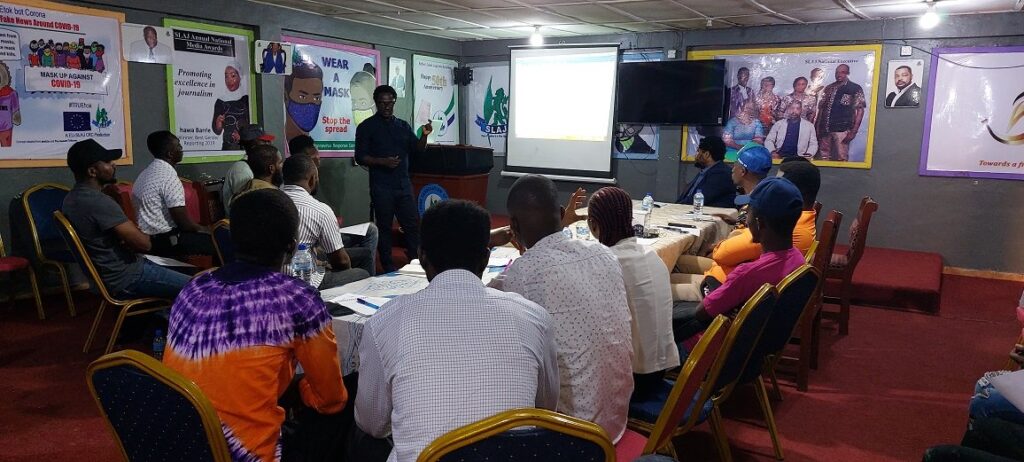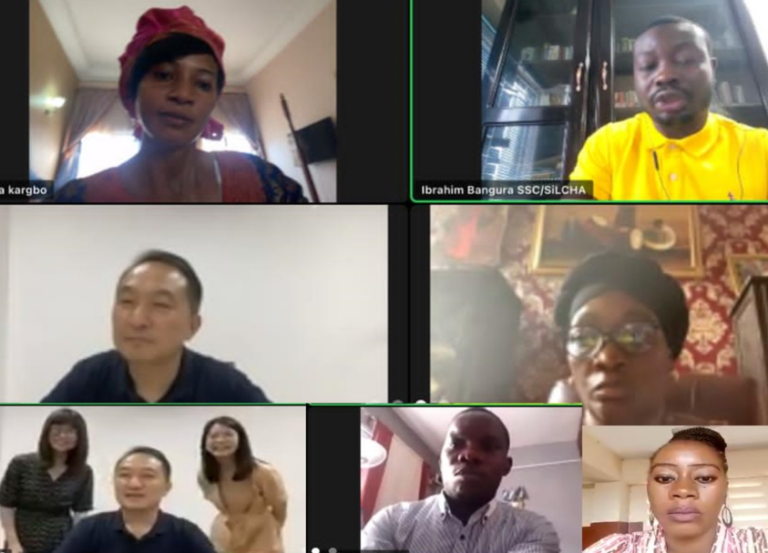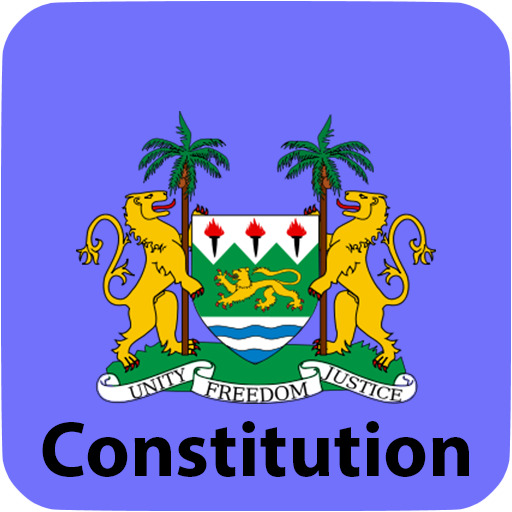The Sierra Leone Association of Journalists (SLAJ) on Wednesday 24th August 2022 held a workshop on the Cyber Security and Crime Act 2021 with bloggers to continue the discussion around the law under a project titled ‘Cyber Safe Sierra Leone.The first and second workshops were held on 8th February and 4th August 2022, respectively.
The essence of the initial engagements, which brought stakeholders from various sectors, including Civil Society Organizations (CSOs) and MDAs at the Harry Yansaneh Memorial Hall, SLAJ Headquarters, 56 Campbell Street, was to look at the Cyber security law again and identify gaps and sections that could be open to abuse of the right to freedom of expression and to develop strategies for awareness raising targeting constituent members.
The workshop was a conscious attempt to bring together bloggers to educate them about the provisions of the law and solicit their support in the awareness-raising drive.
In his opening remarks, SLAJ President, Ahmed Sahid Nasralla, described the workshop as very important since it targeted bloggers who he described as a very important component in the information ecosystem.
Nasralla went on to give a background to the project tracing it back to consultations on the cyber bill and the passing of the Cyber Security and Crime Act 2021 and the need to create public awareness. He highlighted some of the major recommendations made at the first and second workshops and encouraged bloggers to have in mind their own recommendations after the workshop training would have been conducted.
He maintained as usual that: “The law is the law and so we want to promote public awareness about the law so that people understand key provisions to help them avoid coming in conflict with the law. We also want to build advocacy around certain provisions in the law that have the potential to undermine fundamental human rights such as free expression, online freedoms, and data privacy rights,” said Nasralla.
He added that although the law has some grey areas SLAJ is not totally comfortable with, bloggers must abide by them since it remains the law until it is amended.
Dr. Francis Sowa, the facilitator of the workshop, brought the bloggers up to speed with issues discussed and recommendations made during the first and second stakeholders’ consultative meetings.
He emphasized the fact that SLAJ as an institution has not at any time said that cyberspace should not be regulated since the same crimes that exist in the physical space also exist in cyberspace. However, SLAJ’s concern, he said, is the upholding of free speech whilst protecting cyberspace.
“SLAJ and the Media Reform Coordinating Group (MRCG) were actively involved in consultations following the enactment of the Cyber Security and Crime Act 2021. Parliament accepted some of our recommendations and some were not accepted. Now, we want to raise awareness about the law and remind the government about setting up the necessary structures provided for in the Act. And that we should do through advocacy,” said Dr. Sowa.
Dr. Sowa further gauged participants’ knowledge of the Cyber Security and Crime Act 2021 by asking bloggers what they know about the law. One of the participants noted that he heard that there is a new law that seeks to control the internet and those who use it. Kelvin Lamdo from Justice FM online noted that the law is meant to protect banks and financial institutions. Hamza, a blogger, said the law is created to tackle the issue of cyberbullying.
Dr. Sowa agreed with all their definitions and said because of that it is important for everyone to have an idea of the law especially bloggers to ensure they do not get in conflict with the law. He gave a brief history of the internet and how the regulation of cyberspace started.
Dr. Sowa explained the short title of the law, noting that the cyber law is responsible for the prohibition and prevention, detection, prosecution, and punishment of those who break the law.
He said as SLAJ the key focus is lobbying the government to ensure the law is looked into but in the meantime educating the public and for the purpose of the meeting, bloggers need to know the law as it is and how to avoid coming into conflict with the law.
He thoroughly explained the various parts of the law and narrowed in on Section 44 which SLAJ believes is the contentious section. Section 44 deals with Cyberbullying and Cyberstalking, both of which have come out as controversial and ambiguous.
He went on to go through the various defenses available whilst narrowing in on the public interest defense. He shared with bloggers the three-part test in assessing what falls within the public interest but warned that it is journalistic literature that can or cannot be accepted by a competent court of law.
The meeting ended with an interactive session as bloggers had the opportunity to ask questions and get clarifications. Participants were divided into four groups to develop short messages for awareness raising and advocacy around the cyber law, and they later some recommendations for the continuation of the project.
By: SLAJ Secretariat













